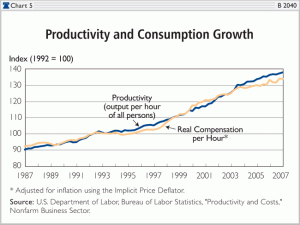In the comments to my post last week on the minimum wage, reader Matt Talbot posed to me the following question:
Blackadder, I’m expecting your answer to be characteristically parsed and lawyerly, but I’ll ask anyway: Do you think there is any imbalance in power between Walmart (say) and a door greeter or stocker that works there? If so, in your libertarian utopia who or what would protect the workers from abuse by management?
It’s a good question. As I’ve made clear on multiple occasions, I don’t think minimum wage legislation is a good way of helping poor workers. Partly this reflects the fact that many minimum wage workers are not actually poor, but are either students, retirees, or others who aren’t relying on those wages as their chief means of support. Partly this reflects my belief that the minimum wage is really always zero, and that if a worker is only worth a certain amount to a business, telling that business that they can only hire him if they pay him more than this amount will lead not to his gaining higher wages, but to his being unemployed.
Okay, fine. But if there’s no minimum wage, what’s to stop businesses from only paying everyone $2 an hour? For that matter, given that the minimum wage is currently less than $7, what’s to stop businesses from paying everyone $7 an hour now? Clearly, we observe that around 95% of workers make more than the minimum wage. So there must be something aside from the law that forces business to pay more. Presumably it’s not that businesses are just altruistic. And only around 10% of workers are unionized, so whatever one thinks of labor unions generally, they aren’t what is keeping wages up for the vast majority of workers.
If I had to sum up what is protecting workers from abuse by employers (not only in a hypothetical libertarian utopia but also in the real world) my main answer would be: competition among employers. If I am worth a certain amount to an employer but am being paid less, then it will be to the advantage of that employers competitors to offer me more in order to capture the additional value that my work can deliver. So to keep me from leaving, my employer will have to pay me a wage close to the marginal productive value that I can provide to him as an employee.
Does this work perfectly in practice? No. But it does work surprisingly well, at least insofar as there is a free labor market. Here, for example, is a comparison of increases in productivity vs. compensation for the last 20 years or so:

Still, even we accept everything that I’ve said so far, the fact remains that there are still a lot of people in this country who don’t make a decent wage. Even if it’s true that their wages reflect their productivity or whatever, still, they are human beings, made in the image and likeness of God, and if competition among employers is not sufficient to secure low productivity workers a Living Wage, then it is not sufficient to protect those workers.
That, at any rate, is more or less the reaction that would expect Matt and others like him to have to what I have said so far. And you know what? I don’t disagree. Contrary to what has often been said or assumed about me on this blog, I am not doctrinaire in my support of libertarian policies. I am quite willing to have the government step in to correct the deficiencies of the market if I think that it would, on balance, actually do some good. If I tend to come down on the libertarian side of most questions it is not because I object on principle to government intervention in the economy, but that I insist that, before I support such an intervention, it be shown that the intervention actually will do good. Not sound good. Not intend good. Do good. And I think, for the reasons outlined above, that minimum wage legislation does not meet that standard.
Now happily, in the case under discussion I do think that government can do to help solve the problem, namely through a negative income tax (as a good individualist, I will ignore for the moment the possibility that the problem could be adequately addressed through some institution other than the State). In fact, the merits of a negative income tax vs. a minimum wage law from a Catholic point of view seem so compelling to me that it is hard for me to understand sometimes why there isn’t more interest in the idea. Perhaps it’s because by the time it comes up in my line of reasoning, people have already tuned me out. Perhaps the negative income tax just doesn’t have the sexiness (what I in another context called the conspicuous compassion value) of the minimum wage. Or perhaps there are compelling arguments against such an idea. All I can say is that if you ask me how in my libertarian utopia I would deal with the fact that the free market alone is not sufficient to guarantee decent wages to all people, then my answer is the negative income tax.












